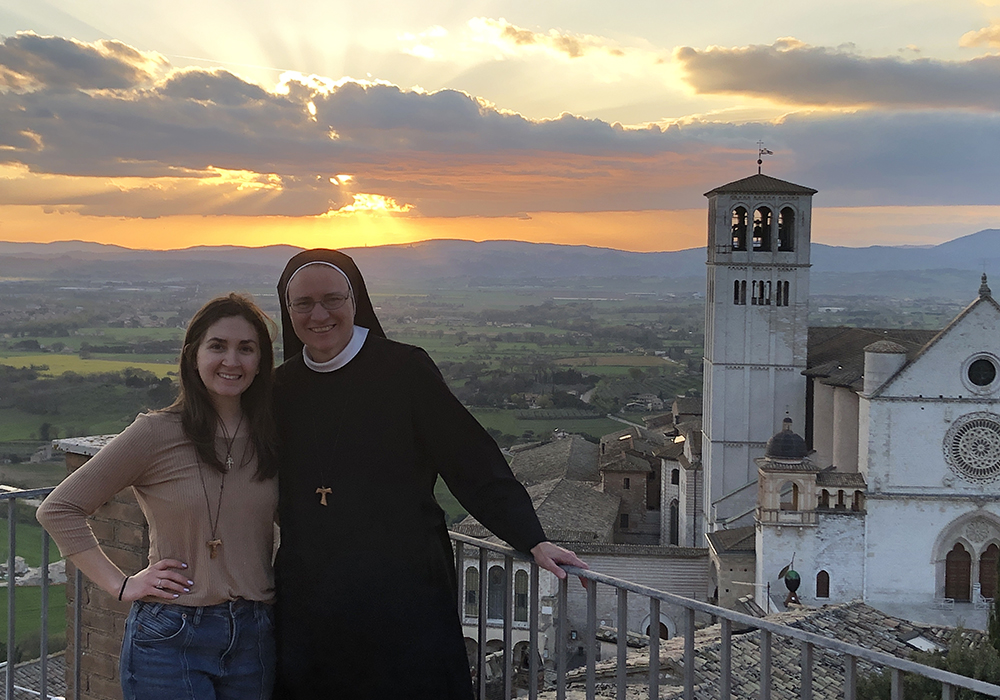
Regina Fontana, left, poses with Sr. Mary Michael Huseman, a Franciscan Sister of Christ the Light, at a pilgrimage to Assisi in April. (Courtesy of Franciscan Sisters of Christ the Light)
The Panhandle Franciscans, formerly known as the School Sisters of St. Francis, were looking for a reset, an updated way to express the heritage of their foundress in a world they believe is in desperate need of the light of the Gospel.
They found it in multiple ways. A new name. An assortment of retreats, some aimed at young women and some open to all. Last but certainly not least, they opened a coffee bar that is quickly becoming a favorite hangout.
While the latter decision hadn't been brewing all that long, the name change and the retreats emerged from years of reflecting on what it means, in this day and age, to bear the mantle of the 13th-century saint and the 18th-century woman who was inspired by him.
For centuries, the Franciscan sisters who made their home in Austria, and then fanned out to America and Argentina, had an education-focused mission, following in the footsteps of foundress Mother Maria Hyacintha Zechner, a Third Order Franciscan committed to teaching girls in an age when few girls received a formal education.
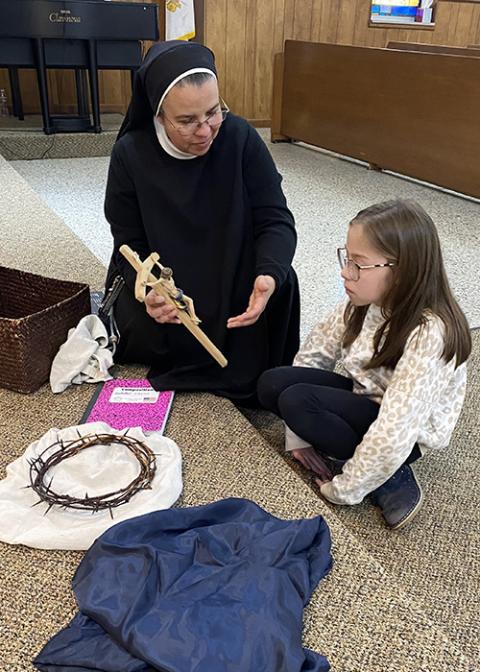
Mother Maria Irina Teiner, a Franciscan Sister of Christ the Light, prepares Isabella Johnson for first Communion in an undated photo. (Courtesy of Franciscan Sisters of Christ the Light)
"We were Franciscans from the very first moment," said Mother Maria Irina Teiner, a native Austrian who now resides with the 14 American sisters in Panhandle, Texas (the town likely has a population of 2,400 on a crowded day). Sixteen other members of the community live in Austria and six more in Argentina.
But over the past 20 years, it had become clear that reassessment of the mission was in order. The orphanage and priests' retirement home where the American branch of the School Sisters of St. Francis ministered had closed their doors. "These institutions were good, and their time had come to completion," said Sr. Mary Ana Steele.
Historically speaking, they have never been a large order, she added. God has kept their own community small, she said. "Sometimes it even looked like it was too small to keep going, and God has kept it going, for whatever purpose."
As the years passed, the sisters mulled, prayed about, and discussed their purpose.
How could they live out their Franciscan identity in a 21st-century culture they believe is full of darkness?
"Education and evangelization are what we do," said Sr. Mary Michael Huseman, the order's vocation director, who keeps the community's Facebook page up to date. "But deeper than that is the charism, the spirit of our mother foundress. Whenever you have a name, and you call yourself that name, it's a reminder of who you are." While their educational heritage was important, she said, it didn't define them.
After years, even decades of discussion, prayer and reflection, they made some changes.
Advertisement
In January, the order, which celebrates the 300th anniversary of its founding this year, approved a new name, something the American sisters had been hoping would happen for years, according to Steele. "Religious life is extremely different than it is in Europe, and anywhere else in the world. We thought if the Holy Spirit wanted this, it would happen."
The School Sisters of St. Francis became Franciscan Sisters of Christ the Light, adopting this charism statement: "We desire to be bearers of the Light of Christ to the spiritually hungry, the lonely and unloved, fostering this light in every soul we encounter."
As Franciscan sisters, said Teiner, their calling is to bring people dwelling in darkness to the light of Christ. The darkness, added Steele, emanates not only from people who are "against God" but those who don't understand how much God loves them.
Though the sisters are no longer working in schools or retirement communities, they are still finding ways to educate and evangelize.
They hold retreats throughout the year, one geared to single women aged 18-40 that focuses on what it means to be "a Christian woman of God," said Huseman. The retreat, mostly based on the teachings of the late Pope John Paul II, evolved out of Sister Mary Michael's work with young women on college campuses. Spiritually hungry themselves, she said, they told her that they were aware other young women were also in need.
"I'm in constant contact with the girls, they're texting me all the time for prayers for support," said Huseman. "Some of them want to come for private retreats."
Regina Fontana, 24, encountered Huseman* and Teiner at a vocation awareness weekend in June* 2022 at the University of Dallas. After chatting with several other sisters, Fontana, who says she was at a transitional point in her life, started talking to Huseman. Soon, she said, "I was bawling my eyes out." After that, they stayed in touch. "I'll talk to her and she'll just stare at me, and I feel like Christ's eyes are looking at me. It's so like beautiful, but I'm just like, wow, it's a lot."
Fontana has attended "Authentic Femininity" and other convent retreats. She really enjoyed the chance to be around other young women "who have that same passion and desire to learn more about themselves, their faith, and how they were created," she said.
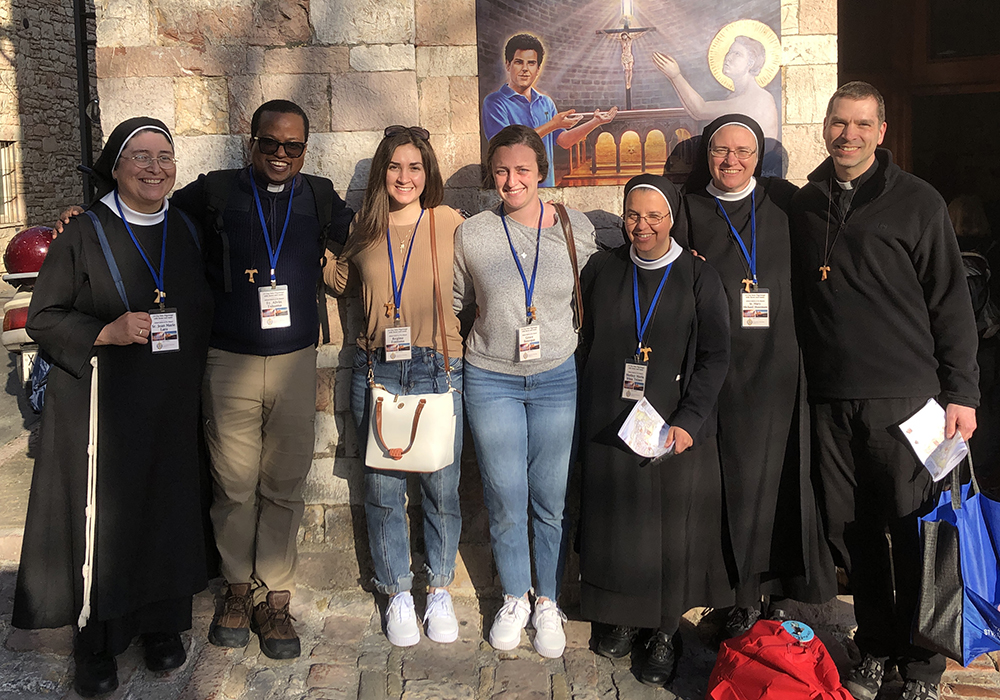
A group of young people on a pilgrimage to Assisi with Franciscan Sisters of Christ the Light (Courtesy of Franciscan Sisters of Christ the Light)
Not only has she made new friends with young women at a similar stage in life, she said, but it has created stronger bonds with the sisters. On a recent sister-sponsored pilgrimage to Assisi, she had a "life-changing" experience, one that enabled her to reject a career path that didn't feel authentic. Fontana, who said she is discerning whether she is called to life in a religious community, plans to attend the sisters' next planned retreat.
Retreats are a fairly tried-and-true method for connecting with outsiders. A coffee shop may be a little less conventional.
Indeed, this largely Protestant town in what Huseman called the buckle of the Bible Belt may be one of the few communities in America to have a coffee shop operated by Catholic nuns.
The way the sisters tell it, the doors just opened.
"We knew it was God because we just went from one thing to another, and the next thing you know, we were opening our doors," said Huseman. "The good side of that is we have the same values. No matter what church you go to, you're pro-life, you believe in God, you try to be a good person, and you're honest and generous."
Yet they were also aware that "some of the people in the Panhandle are hungry. They need food and someone to talk to, to pray with them." The convent was, to some, too threatening, and too far away (literally across the railroad tracks). "We're going to go to the people," said Steele.
Though on the surface a relaxing spot for coffee and a side of chocolate chip cookies seems light years away from the reflective silences of a religious retreat, the creation of the Coffee Break, the sisters say, is another expression of their desire to witness to Christ.
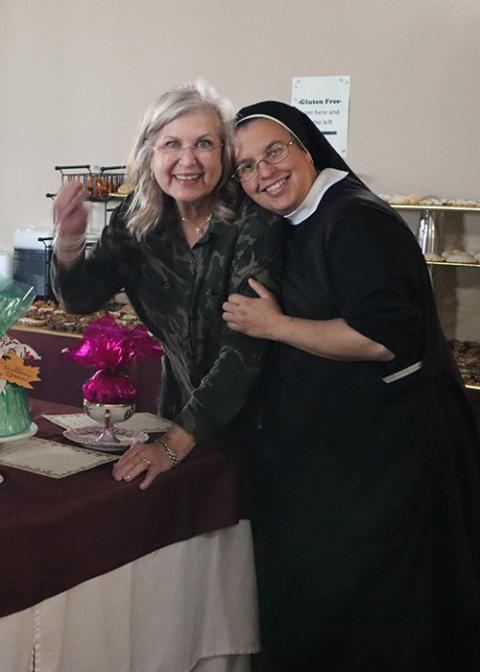
Ann Beddingfield at the sisters' fundraising gala (Courtesy of Franciscan Sisters of Christ the Light)
It's certainly become popular. Since it opened in March 2021, in the midst of the pandemic, the Coffee Break has become an ecumenical gathering spot for area residents.
In a space that was once a barber shop, jewelry store and apartment, the sisters have plenty of rooms for public and private conversations, prayer, board games, and a wide array of coffee-themed drinks and baked goods. Everything is free, though donations are accepted. Somehow, there's always enough in there every month to pay the rent. The leftovers often get distributed to local churches and businesses.
The coffee? Why, it's from Abbey Roast, of course ("not cheap, but totally worth it," said Steele).
Panhandle resident Ann Beddingfield isn't Catholic. But for more than a decade, she's been in charge of the indispensable dessert tables at the order's annual fundraising gala. As a young person, she said, she was intimidated by the sisters and their black habits. Now, a long-standing friend, she enjoys the way the sisters describe themselves: plain people who wear funny clothes.
The coffeehouse, Beddingfield said, is a way to lower divisions between Christians of different worship communities.
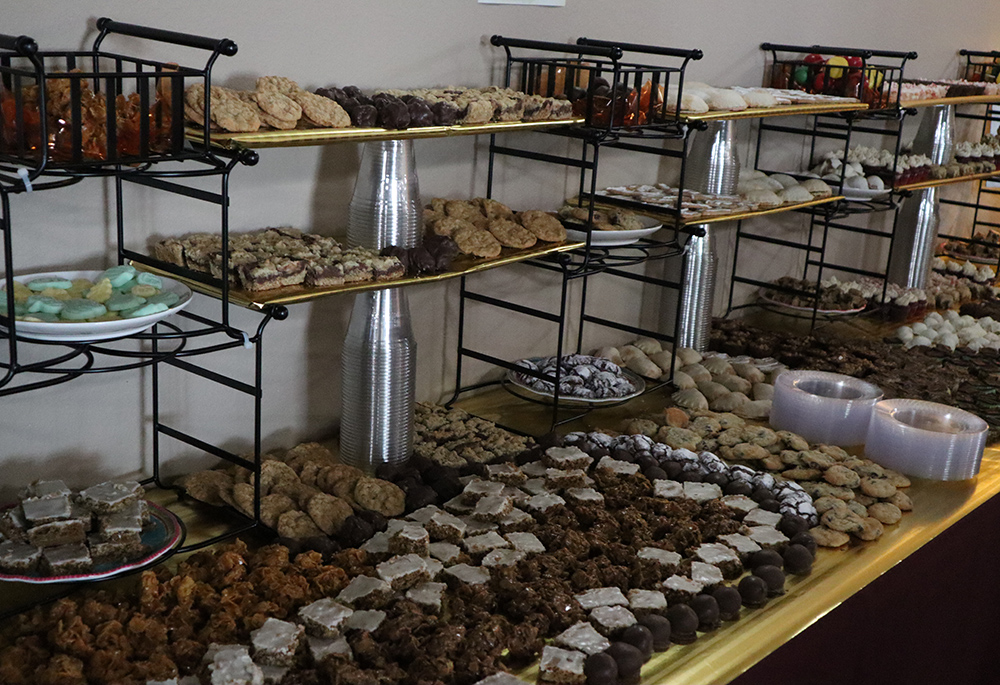
One of the dessert trays Ann Beddingfield helped organize for the gala (Courtesy of Franciscan Sisters of Christ the Light)
"They are just so loving. It's fun to be with them in public because it makes people kind of sit back and learn they are just normal people, showing God's love to the world."
Recently, said Fontana, Huseman asked her, from an outsider's perspective, to describe the mission of the community in a nutshell. She told the vocations director simply, that they had been the light for her.
"When I first met her, I was just so broken and lost," Fontana said, describing that time as the most stressful time of her life. "For the past year, they have been like a light, bringing me and others to Christ. They aren't doing big crazy things. They do the simple things. But it makes such a difference."
*Editor's note: This story has been updated to correct details of Fontana's first encounter with the sisters; she met Huseman and Teiner in June 2022.





